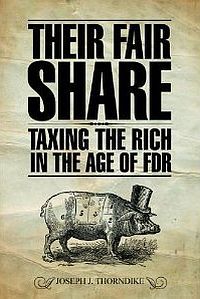

Purchase
Taxing the Rich in the Age of FDR
Urban Institute
January 2013
On Sale: January 18, 2013
322 pages
ISBN: 0877667713
EAN: 9780877667711
Hardcover
Add to Wish List
Non-Fiction History
What part of the tax burden is a ''just share'' or a ''fair share'' is a political question, and its answers are inherently arbitrary. Yet the fair share is arguably the most powerful trope in American tax policy. In the midst of the Great Depression, the fair share was a powerful concept. ''Our revenue laws have operated in many ways to the unfair advantage of the few, and they have done little to prevent an unjust concentration of wealth and economic power,'' said President Franklin Delano Roosevelt in 1935. Such appeals were instrumental in advancing New Deal ideas against moneyed interests. The president advocated progressive taxes while excoriating millionaire tax avoidance, harnessing the electorate's outrage to muster support for rate hikes and new revenue tools. When a Senate investigation found that Wall Street titans like J. P. Morgan Jr. paid no income tax in the darkest days of the depression--without breaking any laws--the nation was shocked. The resulting campaign against loopholes, despite little success, helped convince struggling Americans FDR was looking out for them. Then World War II brought about a desperate need for federal revenue. The solutions--a broad-based progressive tax on individual income, a moderate tax on corporate profits, and a flat-rate levy on wage income--remain central to federal finance today. Between 1939 and 1943, the income tax transformed from a ''class tax'' to a ''mass tax,'' with the number who paid increasing more than sixfold. Ultimately, middle-class Americans agreed to shoulder much of the fiscal burden, chiefly through the income and payroll taxes. In return, they were promised that rich Americans would pay higher rates on their incomes and estates. To the public, Roosevelt made a moralistic case for his tax policies. With Congress and his cabinet, he took a more academic approach than any previous president. His administration favored evidence-based tax policy, creating the first executive office tax staff separate from the Treasury and the Bureau of Internal Revenue. One Treasury official wrote that ''the setting up of a separate organization to carry on tax research was both an expression of the growing recognition of research as an essential staff service in Government and a reflection of the growing importance of intelligent and informed tax policy to the effective functioning of the American economy.'' Their Fair Share: Taxing the Rich in the Age of FDR takes an engaging look at the evolution of today's tax code, as FDR found his reformist intentions tempered by lawmakers on the right and left: conservatives like Rep. Harold Knutson of Minnesota, who warned the media about ''short-haired women and long-haired men of alien minds in the administrative branch ... trying to wreck the American way of life'' and firebrands like Huey ''Kingfish'' Long, who rejected Roosevelt's incremental approach to stump for a guaranteed minimum income and old-age pensions. Even more sober players like Treasury officials Henry J. Morgenthau Jr., Jacob Viner, and Herman Oliphant differed on whether to ''soak the rich'' through steep progressive levies or ''save the poor'' by extending the income tax to the middle class and forestalling federal consumption taxes. Then, as today, we have the president with a progressive reputation who proves more pragmatic than his ardent supporters had hoped. The legislators serve the media with apoplectic rhetoric. The magnates pay no income tax and defend this with the perfectly accurate argument that it is 100 percent legal. And the public is keenly invested in seeing everyone pay their fair share. Joseph J. Thorndike has mined rich insight from governmental and popular media archives to yield vital insights about our tax code and how Americans feel about it, then and now.
Comments
No comments posted.
Registered users may leave comments.
Log in or register now!
| 


 © 2003-2025 off-the-edge.net
all rights reserved Privacy Policy
© 2003-2025 off-the-edge.net
all rights reserved Privacy Policy